
Each time I see or hear the words “police reforms” or “reimagining the police,” I think back to the days of duly qualified accreditation professionals who sift through cop shop’s policies and protocols, scrutinizing every scintilla, ultimately ensuring the candidate law enforcement agency meets muster in myriad ways, predominantly founded in “precepts of community-oriented policing.”
Nationally, the Commission on Accreditation for Law Enforcement Agencies (CALEA) “was created in 1979 as a credentialing authority through the joint efforts of law enforcement’s major executive associations. The CALEA Accreditation program seals [of approval] are reserved for use by those public safety agencies that have demonstrated compliance with CALEA Standards and have been awarded CALEA Accreditation by the Commission.”
CALEA commissioners are former and current law enforcement executives, judges, human resource experts, senators, county politicians, and professors, among other contributors to the cause.
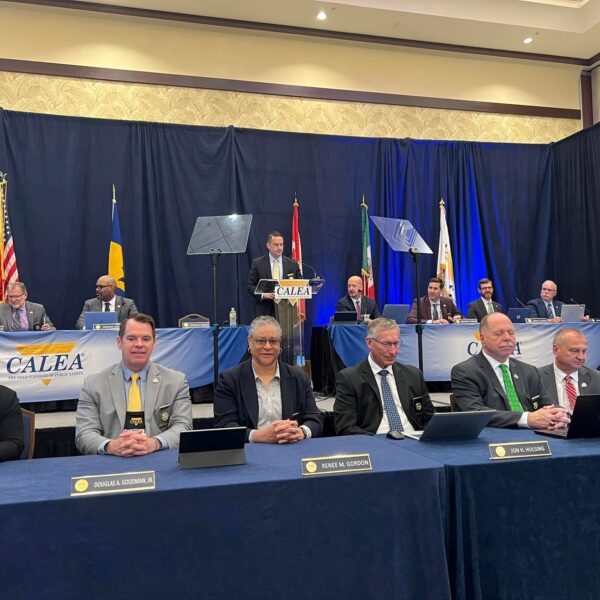
(CALEA commissioners at April 2022 business meeting. Photo courtesy of CALEA.)
Once deemed up to snuff, the “seals” police agencies are granted are emblematic and displayed publicly, like another badge of honor (more on that in a moment).
It is a big decision for agency figureheads (and electeds holding the wallet) to commit to the endeavor. It’s an arduous and lengthy process for law enforcement agencies striving for excellence and scoring pinnacles, culminating in national and/or state-level police accreditation professionals (assessors) granting the gold: A surety of police progressivism.
How does CALEA help police agencies accomplish the public safety mission? Here is a 2-minute synopsis:
“Verification by the Commission is part of a voluntary process to gain or maintain accreditation – a highly prized recognition of law enforcement professional excellence. Once the Commission’s assessors complete their review of the agency, they report back to the full Commission, which will then determine if the agency is to receive accredited status. Florida Highway Patrol’s accreditation is valid for three years,” wrote a spokesperson for the Florida Department of Highway Safety and Motor Vehicles (DHSMV).
Note the mention of three-year intervals between initial accreditation and recertification: in-between processes, police executives do not necessarily get to loosen their class-A neckties or closet the magnifying lens used to self-scrutinize; they set out to do even better each go round. That implies standards are increased, not lowered.
Distractions may arise (read the daily flow of falsities emanating from mainstream media sites, chronically and baselessly dogging cops) but police executives persist in the public safety mission.
As a California Highway Patrol PSA on CALEA accreditation echoed: “No matter how good you think you are, you can always be better” by working “smarter, safer, and more efficiently.”
To ascertain if your local law enforcement agency is nationally certified, you can check the CALEA “Client Database” containing an A-Z list of police entities that made the grade and other particulars, such as staffing levels at the time of accreditation/recertification.
Another way to determine if a police department is accredited is by observing a CALEA sticker affixed to all marked police vehicles. As distinguished above, they refer to them as “seals,” symbolizing the mark of police excellence.
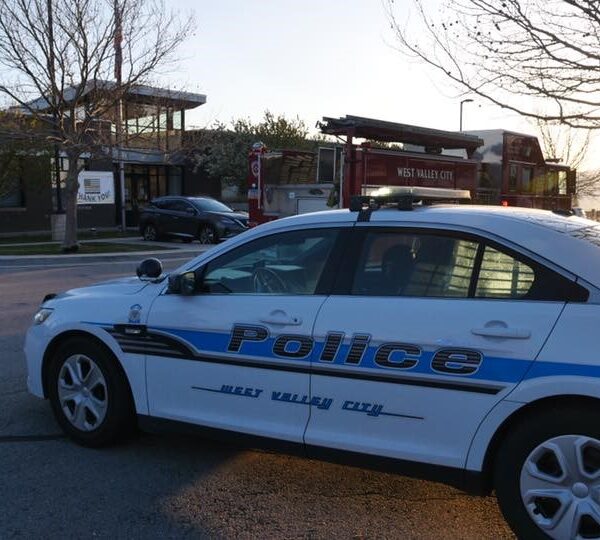
(CALEA sticker affixed to cruiser, just above the front wheel well. Photo courtesy of the West Valley City PD.)
Similarly, check your respective state to see if they, too, have a police accreditation body. In Florida, my agency first endured the rigorous process with designees vetted/authorized by the Commission for Florida Law Enforcement Accreditation, Inc. (CFA), ably judging our agency’s fitness for policing excellence stature.
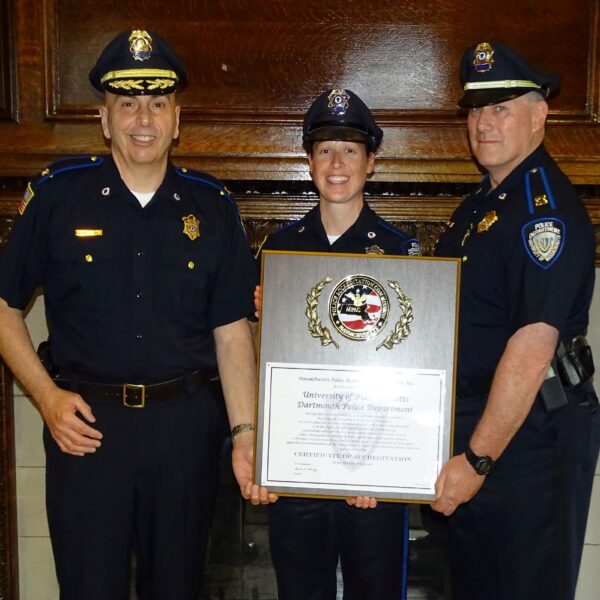
(Massachusetts Police Accreditation Commission achievement plaque proudly held by police execs. Photo courtesy of the UMass Dartmouth Police Department.)
Law enforcement agencies granted state-level accreditation are authorized to affix emblems to the marked fleet. Following is an example displayed on a Coconut Creek police cruiser, placed right above unit #1516:
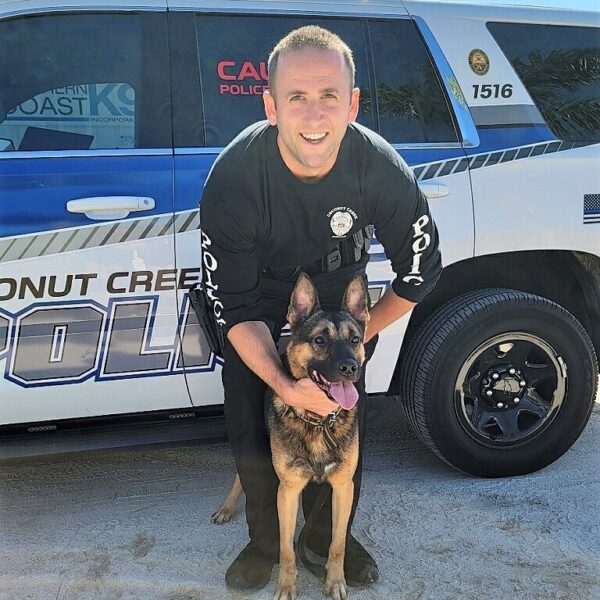
(Photo courtesy of the Coconut Creek Police Department.)
In Pennsylvania, marked cruisers bear the symbol of excellence granted by the Pennsylvania Law Enforcement Accreditation Commission. It appears like this (above the rear-wheel well):
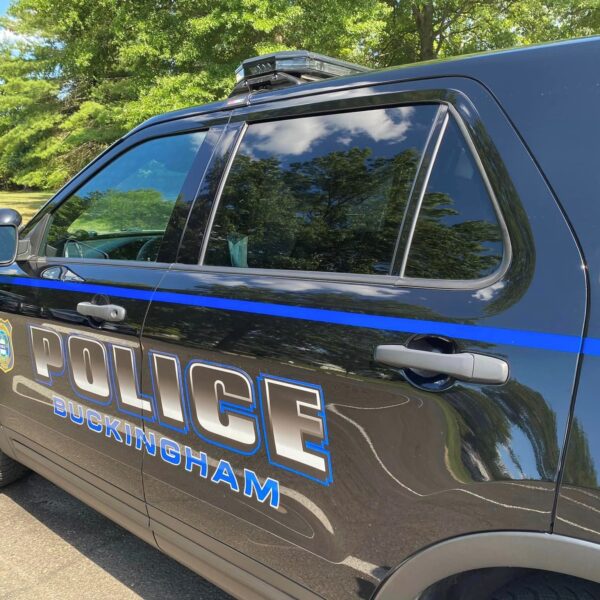
(Photo courtesy of the Buckingham Township Police Department.)
Many months before the official multi-day visit by CFA assessors sleuthing throughout police HQ —its entire fleet, its garage, its sally port, its jail wing and holding cells, its communications center (9-1-1 operators), its training complex, its firing range, and even its security measures such as camera systems surveilling the operation and external access— no stones are left unturned. It’s a chance for a police agency to look in the mirror and comb through its entire public safety embodiment.
Like CALEA’s, Florida’s CFA Standards contain abundant directives which must be abided by to score the seal signifying law enforcement excellence.
Over one week or so, a team of assessors quietly go over ev-er-y-thing. They ask plenty of questions of police personnel via spontaneous quizzes. They do ride-alongs and gauge beat cops’ performance, much like field training officers (FTOs) do with rookie officers.
Typically, police departments assign a certified police officer (or several) as a contact person, to answer assessors’ queries and ask about anything contained within the Bible-thick binder of CFA governance. It is the same formality when CALEA assessors are qualifying candidates, too.
By happenstance, I had the unique opportunity to get involved in my agency’s first at-bat with CFA in Florida. On light duty (which made me a contact person throughout the process, alongside another sworn officer officially titled “Accreditation Manager” and assigned to the Professional Standards Unit), I leafed through the ream of requirements and knew I had a significant study on my hands. At a time when I was sidelined from street duties (cancer treatment rehab), I found it invigorating to have a hand in shaping optimal policing.
My immediate thought back then was Wow! They have everything in here! Blessings for cops and citizens.
I was elated that my agency’s command staff and city council officials had the wherewithal to ensure we were not only operating at maximum capacity but knew how to pave the way to get there and beyond…for years to come. This kind of thing shelves egos and acknowledges the possibility of growth and advancement for the department and its sworn/civilian personnel.
Coventry, Connecticut police Chief Mark Palmer said of his national certification, “CALEA Accreditation gave our personnel a focus and direction with specific and measurable goals.”
I remember the price tag for such a venture was not necessarily chump-change; most things highly worthy are commensurate. I was wowed by the fact the police department’s command staff cemented together the funds granted by an approving city council board. It was telling how serious our police executives and elected officials were focused on progressing the police force for the betterment of all, namely its constituent citizens who, in reality, afford the whole kit and kaboodle.
You see, there are some rather esoteric things with which law enforcement agencies must contend to achieve initial accreditation and each recertification. One example is the proverbial constrained budgets, hence shaved training classes for cops.
Some chapters in the CALEA or CFA binders, empirically directing governance of police operations, comprise everything-Training: how many classes at minimum per fiscal year; some courses specified as paramount fulfillment, etc.
With this structure and covenant of application with due diligence, the caliber of cops was elevated through increasingly being educated. Newer police concepts and trends and philosophies hit the bulletin boards where college-like leaflets could be plucked from pins, completed, and submitted to the supervisory staff for routing and official endorsements.
The changes were noticeable not before long. I do not just mean higher educated and thoroughly trained, I mean morale. Not to imply morale was in the toilet but to indicate how beyond-basic treatment of LEOs parlays wins for everyone. You want cops as oracles and perfect hybrids of superhero/lawyer/doctor (name all the hats you want), then train, train, train them to suit the plurality of mega-skills we demand, especially lately.
On that note, staffing is a crucial benchmark police agencies must fulfill as per accreditation stipulations.
Today’s national dilemma of police exodus and the fever-pitch efforts to fill vacancies is practically bolded and capitalized. Concrete language preempting any hint of cutting corners by admonishing against cheapening any hiring standards whatsoever (ala Mr. Obama’s whim) is evident among accreditation stipulations. Citizens deserve nothing less!
As mentioned above, there’s tons of investment in the A-Z of police progressivism resulting in granting of accreditation, what CALEA refers to as “The Gold Standard of Public Safety.”
Now, instead of knee-jerk notions of defunding the police, wouldn’t it serve America’s communities better to invest in each of the roughly 18,500 law enforcement entities by funding accreditation proceedings, which also assures the citizenry they are receiving top-notch public safety?
This way, reform or reimagining proponents are included and the means to a greater good are collectively activated and achieved.
Among others, one such example is the Florida Highway Patrol. This state agency is pursuing certification from CFA, and it circulated an invitation to the general public to chime in and render opinions, ideas, and wishes toward an increasingly enhanced public safety contingent.
“As part of the assessment, agency members and the public are invited to offer comments to the assessment team,” the DHSMV invite stated. Note the inclusion of “agency members” participating, not being closeted and treated as irrelevant. Breaths of fresh air are always enriching.
My agency published the following invitation about its recertification process: “As part of the three-day assessment on-site, the general public, police department staff, and other city employees are invited to offer comments to the assessment team.”
From the Florida Department of Highway Safety and Motor Vehicles bulletin: “A team of assessors from the Commission for Florida Law Enforcement Accreditation (CFA) will arrive November 8, 2022, to examine all aspects of the Florida Highway Patrol’s (FHP) policies and procedures, management, operations, and support services. FHP is required to comply with numerous standards in order to receive accredited status. Many of the standards are critical to life, health, and safety issues.”
Colonel Gene Spaulding, director of the Florida Highway Patrol, coined it this way: “Maintaining accreditation enhances the Florida Highway Patrol’s ability to effectively provide law enforcement services to the citizens of Florida. Additionally, accreditation increases public confidence in the policies and procedures of the Florida Highway Patrol.”
His words also address the widespread barking coming from certain political factions and their ilk. Thing is, this method of qualifying increasingly stellar safety pros has been transpiring for decades, voluntarily, without mandates…improving on everyone’s behalf.
I do not recall any among the anti-police push mentioning accreditation to any extent. Perhaps because there is no tantrumming involved. Maybe because it precludes melodramatic mindsets pretending to be oracles on police work. I dunno…
What I do know is that accreditation sounds like a winning ingredient in the overall mission of cops to combat crime and ensure law and order. Yes?